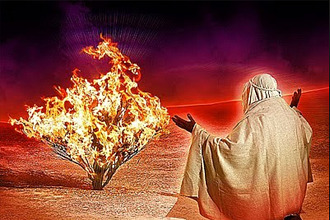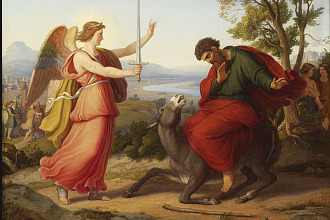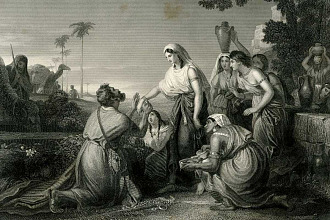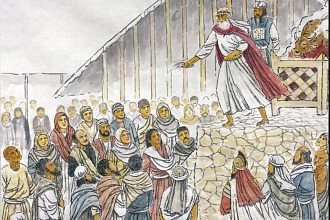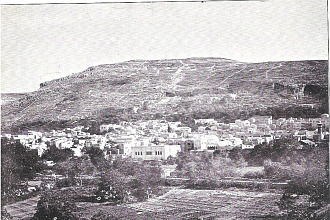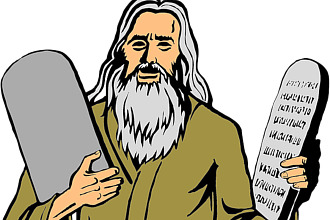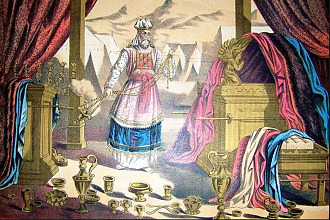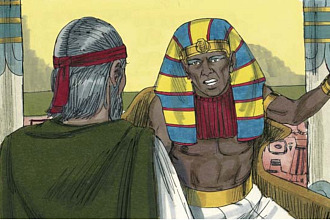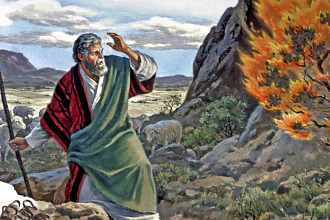Parasha for the Week: Chol Hamoed Pesach.
Overview
We interrupt the reading of the parashot (plural of parasha) during the Shabbat of the feasts. These Shabbatot (plural of Shabbat) called Chol Hamoed are dedicated to reading texts related to the feasts.
The first night is celebrated with a special meal called the Seder which means “order” in Hebrew because everything is done according to a specific order to remember the Exodus and all the miracles G-d performed for Israel in Egypt. Each month of the Jewish calendar is numbered according to its order in the year except the month of Pesach, which is the month of Nissan (before the Exodus, this month was known as the month of Abib, which means Spring). The word “Nissan” comes from the Hebrew word “ness” which means “Miracle”. Nissan is the first month of the year. “The L-RD said to Moses and Aaron in the land of Egypt: This month shall mark for you the beginning of months; it shall be the first month of the year for you” (Exodus 12:1-2). It is the month of reference for the entire Jewish calendar. When the Bible says that Yom Kippur is on the tenth day of the seventh month, it is the seventh month from Nissan. Which lessons can we draw from the month of Nissan? First, it is the first month of Israel, the very beginning of its existence. That means that Israel’s birthday is connected with miracles. Israel would not exist without perpetual miracles from G-d. The second lesson is that when Israel organized their calendar and when they count their days and months it is always in reference to the miracle of their birthday.
The Blood
It was the blood over the doorposts that cause the angle of death to Passover the homes and spare the first born child during the last plague. Salvation of the first born was assured by the blood. The blood of the Mashiach was symbolized at the time of the Exodus by the blood that marked the door-post of each Jewish home. Israel is presented in the Bible as G-d’s first born people. G-d offers salvation to Israel through the blood of the Mashiach, but this blood has to be spiritually sprinkled on the door-post of our heart. That is one of the reasons for circumcision. Blood is poured out at the circumcision. Our heart must be circumcised. Jeremiah (9:26) reproaches Israel that they do not have a circumcised heart. Today nobody among Jews sacrifices the Passover lamb, because Yeshua, the Mashiach, was sacrificed two thousands years ago for each one of us.
Passover Lamb & Role of the Parents
The directions that Moses gave concerning the Passover feast are full of significance, and have an application to parents and children in this age of the world. “Moses called for all the elders of Israel, and said unto them, Draw out and take you a lamb according to your families, and kill the Passover. And ye shall take a bunch of hyssop, and dip it in the blood that is in the basin, and strike the lintel and the two side posts with the blood that is in the basin; and none of you shall go out at the door of his house until the morning. For the Lord will pass through to smite the Egyptians; and when he seeth the blood upon the lintel, and on the two side posts, the Lord will pass over the door, and will not suffer the destroyer to come in unto your houses to smite you.”
The father was to act as the priest of the household and perform this solemn act of sprinkling the door-post with blood. This is a symbol of the work to be done in every family. Parents are to gather their children into the home and to present Mashiach before them as their Passover. The father is to dedicate every inmate of his home to G-d, and to do a work that is represented by the feast of the Passover. It is perilous to leave this solemn duty in the hands of others. This peril is well illustrated by an incident that is related concerning a Jewish family on the night of the Passover. The legend goes that the eldest child was sick; but that he was acquainted with the fact that a lamb was to be chosen for every family, and that its blood was to be sprinkled upon the lintel and side posts of the door so that the L-rd might behold the mark of the blood, and not suffer the destroyer to enter in to smite the first-born. With what anxiety he saw the evening approach when the destroying angel was to pass by. He became very restless. He called his father to his side, and asked, “Have you marked the door-post with blood?” He answered, “Yes; I have given directions in regard to the matter. Do not be troubled; for the destroying angel will not enter here.” The night came on, and again and again the child called his father, still asking, “Are you sure that the door-post is marked with blood?” Again and again the father assured him that he need have no fear; that a command which involved such consequences would not be neglected by his trustworthy servants. As midnight approached, his pleading voice was heard saying, “Father, I am not sure. Take me in your arms, and let me see the mark for myself, so that I can rest.” The father conceded to the wishes of his child; he took him in his arms and carried him to the door; but there was no blood mark upon the lintel or the posts. He trembled with horror as he realized that his home might have become a house of mourning. With his own hands he seized the hyssop bough, and sprinkled the door-post with blood. He then showed the sick child that the mark was there.” RH, May 21, 1895.
Passover is my Personal Salvation
In each and every generation a person is obligated to see himself as if he went out of Egypt, as it says, “And you should tell your child on that day, Because of this Hashem did for me when I went out of Egypt! Not our ancestors alone did the Holy One blessed is He redeem but even us he redeemed with them!” So too when we are seated around the Pesach Seder, we are obligated to imagine that the entire exodus from Egypt was all because of me. “Because of this Hashem did all this for me” He had me in mind at that time that I would be seated here in the 21st century munching Matsot. By imagining it so we weave our way into the fabric of Jewish history and destiny. Redemption is for each one of us, not only our ancestors. The Mashiach gave his life for each one of us. I am personally saved by his blood, you are personally saved by his blood as the Passover lamb blood saved the first born on the Passover night in Egypt.
Learning Torah
Akiva was an ignorant shepherd who worked for one of the wealthiest men in Israel, Kalba Savua. Kalba Savua’s daughter, Rachel, realized Akiva’s potential. They decided to get married. Knowing that her father wouldn’t approve, they were married without his knowledge. When Kalba Savua found out, he barred the couple from his home and they lived in great poverty. Akiva was 40 years old at the time and didn’t even know the Hebrew Aleph Bet! Rachel, however, urged him to go to Yeshiva and study Torah. Akiva was skeptical that at this age he still had a chance to be a Torah scholar. All that changed one day when Akiva passed a large rock upon which drops of water were continuously falling. Akiva noticed that the water had made an indentation in the rock. He thought, “If the water can make an impression in hard rock, surely the Torah can make an impression in my heart and mind!” Akiva decided to listen to his wife and left for the Yeshiva. He started out sitting in class with the little children and, together, they learned the Aleph Beth. Akiva remained in yeshiva. He eventually had thousands upon thousands of students. Rabbi Akiva always gave credit to his wife, Rachel, for his Torah knowledge. Pointing to his wife, Rabbi Akiva once told his students, “All my Torah and all your Torah belong to her!” This phenomenal story of Rabbi Akiva affirms the lesson of Pesach Sheini. It is never too late and one is never too old to perform mitzvot and studying the Torah.







